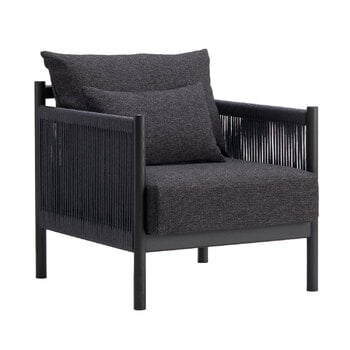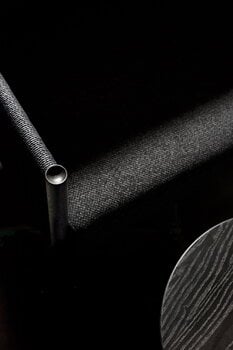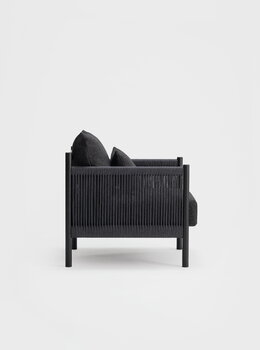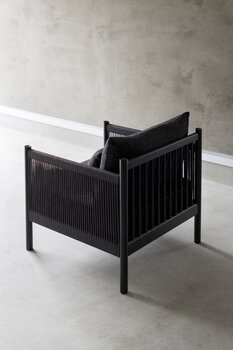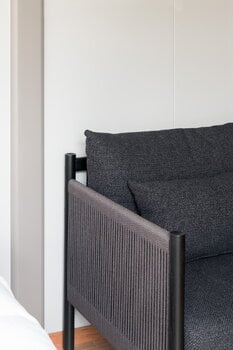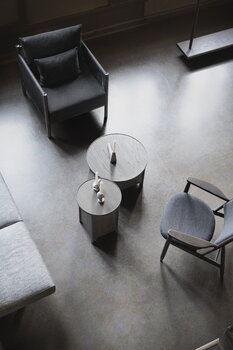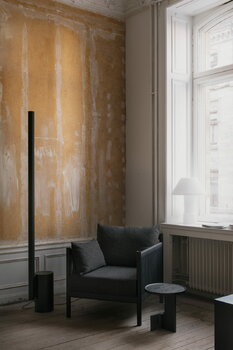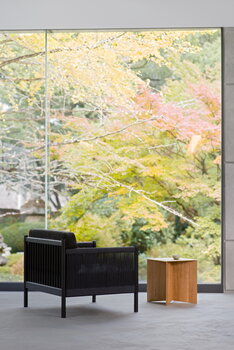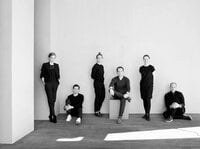Ariake’s Braid lounge chair was named after the braided paper cords adorning the chair’s armrests. The Braid lounge chairs were inspired by bamboo constructions and tatami mats, classic elements in Japanese architecture. Braid’s clean-lined appearance also features references to Danish design tradition. Due to the subtle decorations on the chair’s armrests and back, Braid is an ideal piece of furniture to divide a room.
Braid lounge chair, black
Ariake
Description
Ariake’s Braid lounge chair was named after the braided paper cords adorning the chair’s armrests. The Braid lounge chairs were inspired by bamboo constructions and tatami mats, classic elements in Japanese architecture. Braid’s clean-lined appearance also features references to Danish design tradition. Due to the subtle decorations on the chair’s armrests and back, Braid is an ideal piece of furniture to divide a room.
Product details (9)
- Colour
- Black
- Width
- 73 cm
- Depth
- 79.5 cm
- Height
- 83 cm
- Seat height
- 40 cm
- Frame material
- Sumi ink painted, matt lacquered ash; paper cord
- Seat cushion
- HR foam
- Backrest cushion
- HR foam, acrylic balls
- Upholstery fabric
- 100% polyester
- Product ID
Designer
Norm Architects is a dynamic design duo composed by the Danish architects Kasper Rønn (b. 1976) and Jonas Bjerre-Poulsen (b. 1976), both graduates of the Royal Danish Academy of fine Arts in Copenhagen. Being true modernists, they believe in design where the focus is in meeting a real need instead of creating one, and this reflects from their work as architects as well as industrial designers.
Though bearing a strong admiration for some of the most pure minimalists, Norm Architects is not easy to categorize. The architects see their work as a part of the Scandinavian modernist tradition – functional, minimal, poetic and timeless – with a profound understanding of natural materials and a special attention to detail. One of their most successful products is the MILK lamp, designed for &Tradition, that combines wood and glass.
View all productsReviews (0)
Sustainability
The Product Sustainability Framework, our criteria of sustainable design, helps you find the most sustainable products in our selection. Read below which sustainability criteria this product has met.
Working conditions & labour 8/9
-
Equal opportunities for all employees
-
Commitment to UN Global Compact, fair compensation for all employees
-
Corporate responsibility requirements defined and communicated for suppliers
-
Systematic work for improved inclusion and well-being in the workplace
-
Transparent supply chain
-
Suppliers' compliance to a code of conduct ensured
-
Compliance to the UN Guiding Principles on Business and Human Rights ensured in the supply chain
-
Support for community involvement in the supply chain
-
Direct suppliers audited and certified
Eco-friendly production 9/9
-
Fair and resource-wise water-use in production
-
No incineration or landfilling of returned items
-
No use of endangered species as materials
-
No direct environmental emissions or waste (excl. GHGs) from production
-
The sustainability of direct suppliers' production is addressed and monitored
-
Production and material sourcing that respect biodiversity, animal rights, and natural ecosystems
-
Material-efficient and ecological packaging
-
Positive impact on nature’s well-being through operations that regenerate natural ecosystems
-
No potentially harmful chemicals used in own production
Climate impact 4/8
-
Company's direct greenhouse gas emissions identified and commitment to reduction
-
Product's carbon impact identified and commitment to reduction
-
Guidance on energy- and eco-efficient use of the product
-
Contribution to climate initiatives beyond the brand’s direct operations
-
Low-carbon or compensated transportation
-
Carbon footprint of the product calculated and goals set to reduce it
-
100 % renewable energy in own production and operations
-
Carbon neutral or carbon negative product
Sustainable materials 5/6
-
Sustainable and long-lasting material choices
-
No harmful or hazardous substances
-
Responsible raw material sourcing and production
-
Materials suited for circularity: monomaterials, recyclable finishings, renewable or recycled contents etc.
-
Ecological materials: natural, biodegradable, recyclable or recycled contents
-
Outstanding materials in terms of innovativeness, responsibility, sustainability and circularity: local production or sourcing, 100 % recycled content, C2C-certification etc.
Circular design 4/5
-
High aesthetic quality promoting long-term use of the product
-
Technically durable product design and material choices
-
Design for enduring life-long quality
-
Design and support for product maintenance, repair and upgradability
-
Innovative circular design solutions: circular service system, resale platform, remanufacturing, collection of used products, etc.

